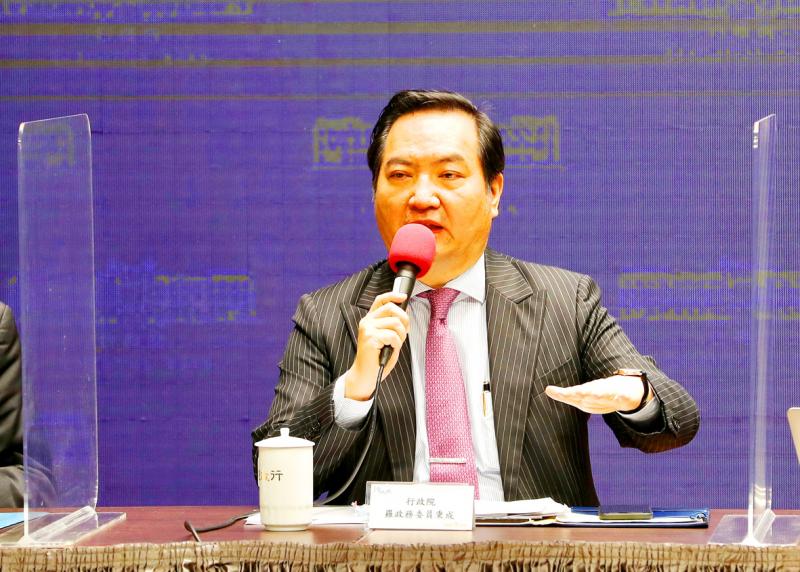The Executive Yuan yesterday approved a package of amendments to the Civil Code that would lower the age of majority from 20 to 18, which, if passed by the Legislative Yuan, is expected to take effect in 2023.
The package includes 38 legal amendments involving 14 central government agencies, Minister Without Portfolio Lo Ping-cheng (羅秉成) told a news conference at the Executive Yuan in Taipei.
The proposals were made to bring the nation in line with the international trend, as the age of majority in the US, the UK, France and Germany are all 18, Lo said, adding that Japan in 2018 also passed legislation that lowered the legal age to 18.

Photo: CNA
The age of criminal responsibility is 18, but the legal age defined by the code is 20, which has resulted in incongruities, he said.
Furthermore, the legal age of marriage for men is 18, but 16 for women, which runs counter to the values of gender equality, he said.
International experts have said that the nation’s marriageable age for women contravenes the UN Convention on the Rights of the Child and The Convention on the Elimination of all Forms of Discrimination Against Women, and that allowing women to marry at the age of 16 is tantamount to condoning child marriage, he said.
The legal age in the code was defined in 1929, which no longer fits today’s needs, considering how much more mature young people are today than in the past, he said.
If passed, Taiwanese who have turned 18 would be able to do a list of things that they would otherwise have had to wait, including renting a house, signing a contract, opening a bank account, starting a company or serving as a company director, filing a lawsuit or becoming members of commercial or education groups, he said.
The lowering of the legal age would have a profound impact on the nation and usher in a new era, he said, adding that it is imperative that all agencies affected adjust their administrative work accordingly.
Society today is far more advanced from 91 years ago in that people are more educated and enlightened, which merits the lowering of the legal age, Premier Su Tseng-chang (蘇貞昌) said.
There are 110 nations in the world that set their age of majority at 18, he said.
Academics, civic groups and students have long called for the age to be lowered, and the changes have been proposed in response to public expectations, he said.
Government agencies should communicate extensively with legislative caucuses so that the proposals could swiftly be passed into law, he said.
National Alliance of Parents Organizations chairman Hsieh Kuo-ching (謝國清) said he welcomed the amendments, but added that the government should improve education on students’ problem solving skills and help them learn to be responsible for their decisions.
Additional reporting by Rachel Lin

CHAOS: Iranians took to the streets playing celebratory music after reports of Khamenei’s death on Saturday, while mourners also gathered in Tehran yesterday Iranian Supreme Leader Ayatollah Ali Khamenei was killed in a major attack on Iran launched by Israel and the US, throwing the future of the Islamic republic into doubt and raising the risk of regional instability. Iranian state television and the state-run IRNA news agency announced the 86-year-old’s death early yesterday. US President Donald Trump said it gave Iranians their “greatest chance” to “take back” their country. The announcements came after a joint US and Israeli aerial bombardment that targeted Iranian military and governmental sites. Trump said the “heavy and pinpoint bombing” would continue through the week or as long

TRUST: The KMT said it respected the US’ timing and considerations, and hoped it would continue to honor its commitments to helping Taiwan bolster its defenses and deterrence US President Donald Trump is delaying a multibillion-dollar arms sale to Taiwan to ensure his visit to Beijing is successful, a New York Times report said. The weapons sales package has stalled in the US Department of State, the report said, citing US officials it did not identify. The White House has told agencies not to push forward ahead of Trump’s meeting with Chinese President Xi Jinping (習近平), it said. The two last month held a phone call to discuss trade and geopolitical flashpoints ahead of the summit. Xi raised the Taiwan issue and urged the US to handle arms sales to

State-run CPC Corp, Taiwan (CPC, 台灣中油) yesterday said that it had confirmed on Saturday night with its liquefied natural gas (LNG) and crude oil suppliers that shipments are proceeding as scheduled and that domestic supplies remain unaffected. The CPC yesterday announced the gasoline and diesel prices will rise by NT$0.2 and NT$0.4 per liter, respectively, starting Monday, citing Middle East tensions and blizzards in the eastern United States. CPC also iterated it has been reducing the proportion of crude oil imports from the Middle East and diversifying its supply sources in the past few years in response to geopolitical risks, expanding

An Emirates flight from Dubai arrived at Taiwan Taoyuan International Airport yesterday afternoon, the first service of the airline since the US and Israel launched strikes against Iran on Saturday. Flight EK366 took off from the United Arab Emirates (UAE) at 3:51am yesterday and landed at 4:02pm before taxiing to the airport’s D6 gate at Terminal 2 at 4:08pm, data from the airport and FlightAware, a global flight tracking site, showed. Of the 501 passengers on the flight, 275 were Taiwanese, including 96 group tour travelers, the data showed. Tourism Administration Deputy Director-General Huang He-ting (黃荷婷) greeted Taiwanese passengers at the airport and